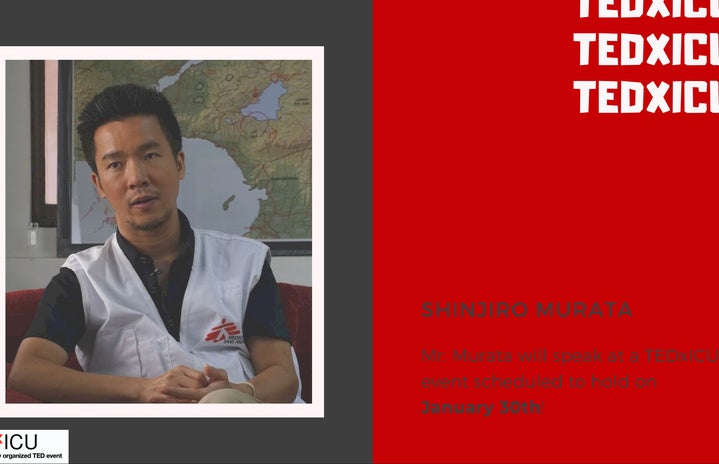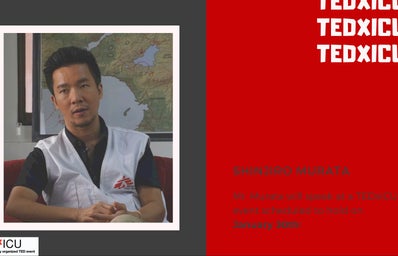TEDxICU is a student non-profit organization that aims to provide a TED-like experience for people to express their ideas, be inspired, and find a motivation to step out of their comfort zones. Mr. Murata will appear at the TEDxICU event scheduled to be held on 30th January from 1-5 pm. The event will be held online with YouTube Premiere and Zoom. Please visit TEDxICU’s official website and Instagram for more information!
U: Utako Kawakami (HCICU Writer)
M: Shinjiro Murata (TEDxICU Speaker)
Shinjiro Murata, the first Japanese head of the office of Médecins Sans Frontières (MSF) Japan, says the following.
“Although sometimes things feel helpless, we know that we are not just “providing medical care”. I learned that we are also bringing hope to those who are in the depths of despair. That’s how I decided that I would do this job forever.”
Médecins Sans Frontières (MSF) is a non-government and profit international organization that provides medical care and humanitarian aid from an independent, impartial, and neutral position. MSF was established in 1971, and the Japan office started in 1992.
Their activities aim to respond to the most urgent medical needs. This includes victims of conflict or natural disasters or those who cannot receive health or medical services due to various reasons such as poverty.
Mr. Murata from MSF will speak about his experiences in the fields of humanitarian aid as a part of the MSF team, what he went through to become who he is right now; how he built his future.
U: What did you plan on studying when you entered university?
M: I don’t… remember…
U: Then, what kind of student were you?
M: I was not a student to be proud of.
I took a gap year and entered Shizuoka University, but since I was very much happy with the fact that I had been released by the long exam-cramming to get into the university, I told myself that I was simply going to enjoy my university years.
I was quite devoted to my club activities and did not have goals or determinations for my future.
After a few years at a foreign IT company, Mr. Murata came to hold a dream — to help those who are put in vulnerable positions around the world, through his job.
U: How did you come to hold this dream?
M: Because I didn’t do much during university, and also since the employment process was very challenging at that moment (referred to as ‘employment ice age’ in Japanese: 就職氷河期), my first job search had wiped out. I was not even called for a single interview.
After that, I decided to take a year off and I thought thoroughly about how I wanted to live my life.
I graduated from university and entered a foreign IT company. Only after my first few years, I could not help but think “Am I really going to spend the rest of my life like this?”
After a while, I entered MSF and was sent to Darfur in Sudan.
Mr. Murata will be talking about why and how he entered MSF, and what difficulties he faced on his path, in his TEDxICU talk. Make sure to listen to his story on the 30th of January!
U: What is the best part of your job?
M: First of all, the fact that I can see the impact of what we do with my own eyes. And I can easily tell how much more our work is needed as well.
Also, I can be proud of all my colleagues.
There are so many amazing people. If they had simply worked in their home country, they all could have had a much better and more comfortable life, but they are all working under these harsh conditions to abbreviate the pains of people they don’t even know.
At MSF, people of different backgrounds, looks, and ethnicities work together with a common language for those that are most vulnerable. This really makes me believe that I will indeed continue this job forever.
U: Now, what are the hardest parts of your job?
M: My biggest goal is to increase access to medical care in disputed lands.
However, there are so many large obstacles I need to overcome to achieve this goal.
Before anything, we need higher recognition and support for humanitarian aid within Japan. To achieve this, we must improve our office first.
To achieve endlessly large goals like mine, I believe that there is a need to first work on the things that are right in front of you.
U: What does the MSF office do specifically?
M: We advocate and recruit people of both medical and non-medical backgrounds within Japan to send to the fields. We also conduct donations since 90% of our funds come from non-governmental sources.
As an advocacy, we communicate the things we have seen in the fields —- the despair and the suffrage with Japanese society —- with the desire to change the situation.
U: How has COVID-19 affected the activities of MSF?
M: Last year was extremely hard for us.
Supplies and staff provision were largely delayed because many countries had sealed their borders and planes stopped flying.
Plus, I heard that in the early days of the pandemic, my colleagues had not known about the COVID-19 pandemic, so they would have to deal with a massive stream of patients without knowing what was really going around.
Things like masks or oxygen tanks that are necessary items for COVID patients, although commonly available in Japanese hospitals, were already limited pre-pandemic, limiting the supply provided to the patients themselves.
Also, there are large numbers of people living in densely-packed refugee camps, so there was no way for infection control either.
Japan had also gone through a “medical collapse”, and throughout zones in conflict, the medical institutions that had already been trapped were further pressed.
TEDxICU will be an extraordinary opportunity to listen to Murata Shinjiro, who has become the head of the office of the MSF from being just a typical university student, and who today is working in various ways to increase access to medical care in lands in dispute.
We hope to see you all there!


